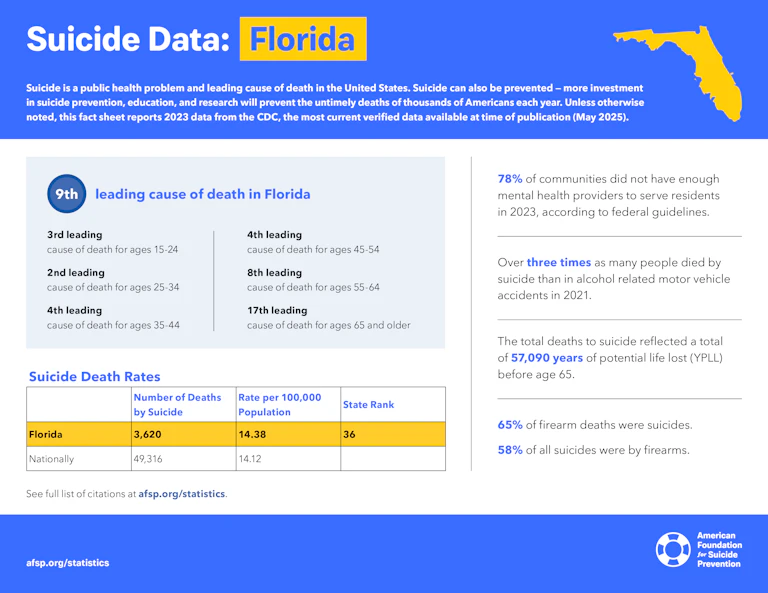Florida

Florida suicide prevention plans and initiatives
In 2007 Florida law established the Statewide Office for Suicide Prevention (SOSP), currently within the Department of Children and Families (DCF) under the Office of Substance Abuse and Mental Health, to improve statewide suicide prevention initiatives (§ 14.2019). The law also established the Florida Suicide Prevention Coordinating Council (SPCC), which is charged with advising SOSP and held accountable to the legislature for designing strategies to implement the state’s suicide prevention strategy (§ 14.20195). In 2020, the First Responders Suicide Deterrent Task Force was created adjunct to the SOSP and tasked with releasing an annual report on its findings and recommendations for training programs and materials to deter suicide among active and retired first responders (§ 14.2019(5)); see the latest 2023 report.
In 2019 an Interagency Committee chaired by SOSP and the Department of Health was established to urge state agencies to take a more active role in statewide suicide prevention efforts and collaborate with SPCC on the updated The Florida Suicide Prevention Interagency Action Plan: August 2020 – June 2023. The SPCC is also responsible for an annual report (§ 14.20195(c)) that includes the status of existing and planned initiatives identified in the state plan as well as new recommendations to enhance suicide prevention efforts.
Florida laws
Key:
- Required by law
- Encouraged by law
- No law in place
Crisis lines and 988 implementation
- Addresses 988 infrastructure and provides for telecom user fee
- Addresses 988 infrastructure but does not include telecom user fee
- 988 law limited to creating an exploratory commission, advisory committee, or task force
Mental health parity
- Public health plans (e.g., Medicaid) regularly submit parity compliance analyses to state regulators
- Private health plans (individual and group) regularly submit parity compliance analyses to state regulators
K – 12 school suicide prevention
- Inclusion of the 988 Suicide & Crisis Lifeline and/or other crisis line(s) on student ID cards
- Student allowances for excused mental health absences
- School personnel must report student suicide risk to a parent and/or guardian
- Suicide prevention and/or mental health training for certain school personnel, annual
- Suicide prevention and/or mental health training for certain school personnel, not annual
- Suicide prevention, intervention, and postvention policies/programming
- Student education on suicide prevention
- Student education on mental health
Health professional training in suicide assessment, treatment and management
- Mental health professionals receive regular training
- Mental health professionals receive one time training
- Medical/surgical professionals receive regular training
- Medical/surgical professionals receive one time training
Conversion therapy bans
- Prohibits licensed/board certified mental health providers from engaging in conversion therapy with minors under 18 years of age
- Prohibits licensed/board certified mental health providers from engaging in conversion therapy with vulnerable adults
- Prohibits use of state funds for any purpose related to conversion therapy (e.g., conducting, making a referral for, or extending health benefits coverage for)
University and college campus suicide prevention
- Inclusion of the 988 Suicide & Crisis Lifeline and/or other crisis line(s) on student ID cards
- Students receive information on available mental health and/or suicide prevention services and/or resources
- Adoption of suicide prevention/awareness policy or program
Firearms
- Process for extreme risk protection orders (ERPOs)
- State voluntary do not sell list